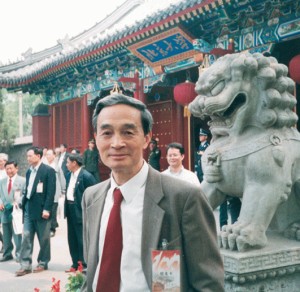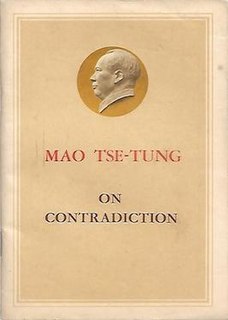Related Research Articles

The Chinese Communist Party (CCP), officially the Communist Party of China (CPC), is the founding and sole ruling party of the People's Republic of China (PRC). The CCP leads eight other legally permitted subordinate minor parties together as the United Front. The CCP was founded in 1921, mainly by Chen Duxiu and Li Dazhao, with the help of the Far Eastern Bureau of the Communist Party of the Soviet Union and Far Eastern Secretariat of the Communist International. The party grew quickly; by 1949 the Nationalist Government of the Kuomintang (KMT) had been driven from mainland China to Taiwan after the Chinese Civil War, leading to the establishment of the People's Republic of China on 1 October 1949.
Maoism, officially called Mao Zedong Thought by the Chinese Communist Party, is a variety of Marxism–Leninism that Mao Zedong developed for realising a socialist revolution in the agricultural, pre-industrial society of the Republic of China and later the People's Republic of China. The philosophical difference between Maoism and traditional Marxism–Leninism is that the peasantry are the revolutionary vanguard in pre-industrial societies rather than the proletariat. This updating and adaptation of Marxism–Leninism to Chinese conditions in which revolutionary praxis is primary and ideological orthodoxy is secondary represents urban Marxism–Leninism adapted to pre-industrial China. The claim that Mao Zedong had adapted Marxism–Leninism to Chinese conditions evolved into the idea that he had updated it in a fundamental way applying to the world as a whole.
From November 1978 to December 1979, thousands of people put up "big character posters" on a long brick wall of Xidan Street, Xicheng District of Beijing, to protest about the political and social issues of China. Under acquiescence of the Chinese government, other kinds of protest activities, such as unofficial journals, petitions, and demonstrations, were also soon spreading out in major cities of China. This movement can be seen as the beginning of the Chinese Democracy Movement. It is also known as the "Democracy Wall Movement". This short period of political liberation was known as the "Beijing Spring".
The Chinese New Left is a term used in the Peoples Republic of China to describe a diverse range of left-wing political philosophies that emerged in the 1990s that are critical of the economic reforms instituted under Deng Xiaoping, which emphasized policies of market liberalization and privatization to promote economic growth and modernization. Chinese academic Wang Hui links the emergence of New Leftism with the financial crisis of 1997 and the 1999 United States bombing of the Chinese embassy in Belgrade, which damaged the credibility of liberalism in China, as well as the 1989 Tiananmen suppressions.

Chen Boda, was a Chinese Communist journalist, professor and political theorist who rose to power as the chief interpreter of Maoism in the first 20 years of the People's Republic of China. Chen became a close associate of Mao Zedong in Yan'an, during the late 1930s, drafting speeches and theoretical essays and directing propaganda.
Peter Joseph Boettke is an American economist of the Austrian School. He is currently a professor of economics and philosophy at George Mason University; the BB&T Professor for the Study of Capitalism, vice president for research, and director of the F.A. Hayek Program for Advanced Study in Philosophy, Politics, and Economics at the Mercatus Center at GMU.
Deng Xiaoping Theory, also known as Dengism, is the series of political and economic ideologies first developed by Chinese leader Deng Xiaoping. The theory does not claim to reject Marxism–Leninism or Mao Zedong Thought, but instead seeks to adapt them to the existing socio-economic conditions of China.

Wang Ruoshui, was a Chinese journalist, political theorists and philosopher. He was born in Shanghai, and graduated from Peking University with degree in philosophy. After working at the People's daily for over three decades, Wang was expelled from the party in 1987 during the Anti-Bourgeois Liberalization Campaign, largely due to his long-standing vocal advocacy of Marxist humanism that led to the Anti-Spiritual Pollution Campaign in 1983. After his exile from the party, he went to United States as a visiting scholar to continue his research. Wang was known as a major exponent of Marxist humanism and of Chinese liberalism in the second half on his life.

On Contradiction is a 1937 essay by the Chinese Communist revolutionary Mao Zedong. Along with On Practice it forms the philosophical underpinnings of the political ideology that would later become Maoism. It was written in August 1937, as an interpretation of the philosophy of dialectical materialism, while Mao was at his guerrilla base in Yanan. Mao suggests that all movement and life is a result of contradiction. Mao separates his paper into different sections: the two world outlooks, the universality of contradiction, the particularity of contradiction, the principal contradiction and principal aspect of contradiction, the identity and struggle of aspects of contradiction, the place of antagonism in contradiction, and finally the conclusion. Mao further develops the theme laid out in On Contradiction in his 1957 speech On the Correct Handling of Contradictions Among the People.
Mark Blaug FBA was a Dutch-born British economist, who covered a broad range of topics during his long career.

Arif Dirlik was a Turkish-American historian who published on historiography and political ideology in modern China, as well as issues in modernity, globalization, and post-colonial criticism. Dirlik received a BSc in Electrical Engineering at Robert College, Istanbul in 1964 and a PhD in History at the University of Rochester in 1973.
Xiaokai Yang was a Chinese-Australian economist. He was one of the world's pre-eminent theorists in economic analysis, and an influential campaigner for democracy in China.
Ross Terrill is an Australian-born American political scientist and historian. He specializes in the [[history of China]], especially the history of the People's Republic of China. He has made several public appearances in order to testify in front of the United States Congress, and he has also written numerous articles and nine books. For many years he has been a Research Associate at Harvard's Fairbank Center for Chinese Studies, and recently, he was a visiting professor at the University of Texas at Austin as well as a visiting professor at Monash University in Australia.
Benjamin Isadore Schwartz was an American academic, political scientist, and sinologist who wrote on a wide range of topics in Chinese politics and intellectual history.
Joseph Camilleri is an Australian citizen of Maltese descent. He is a social scientist and philosopher. In philosophy he mostly specialised and interested in international relations.
The ideology of the Chinese Communist Party has undergone dramatic changes throughout the years, especially during Deng Xiaoping's leadership and the contemporary leadership of Xi Jinping.
Chinese Marxist philosophy is the philosophy of dialectical materialism that was introduced into China in the early 1900s and continues in the Chinese academia to the current day.
Colin Patrick Mackerras is an Australian sinologist, Emeritus Professor at Griffith University, and specialist in Chinese culture. He has published on Chinese drama, national minorities of China, Australian-Chinese relations and images of China in the West.
John Wanna is Professor Emeritus at both the Australian National University (ANU) and Griffith University. Before retiring in 2019, Wanna was the Foundation Professor with the Sir John Bunting Chair of Public Administration at the Australia and New Zealand School of Government (ANZSOG) based at the ANU. He held this position from 2004-2019. Prior to that he was Professor of Public Policy at Griffith University.

Xi Jinping Thought on Socialism with Chinese Characteristics for a New Era, commonly abbreviated outside China as Xi Jinping Thought, is a set of policies and ideas derived from the writings and speeches of Chinese Communist Party General Secretary Xi Jinping. It was first officially mentioned at the 19th National Congress of the Chinese Communist Party in 2017, in which it was incorporated into Constitution of the Chinese Communist Party. At the First Session of the Thirteenth National People's Congress on 11 March 2018, the preamble of the Constitution of the People's Republic of China was amended to mention Xi Jinping Thought.